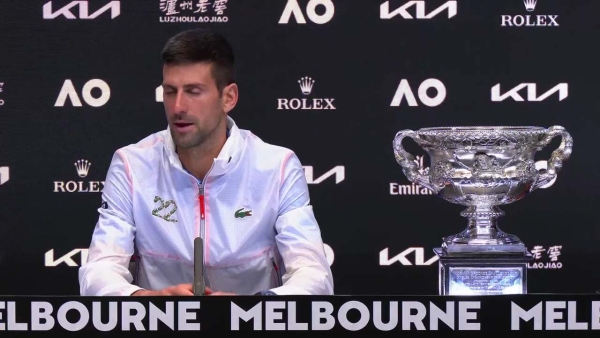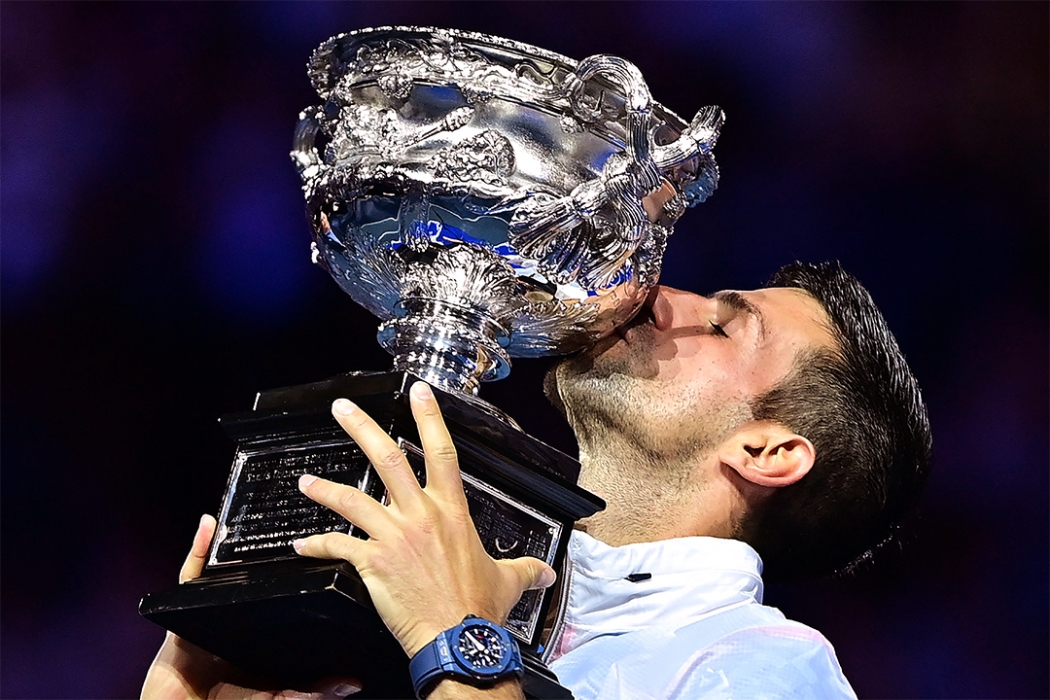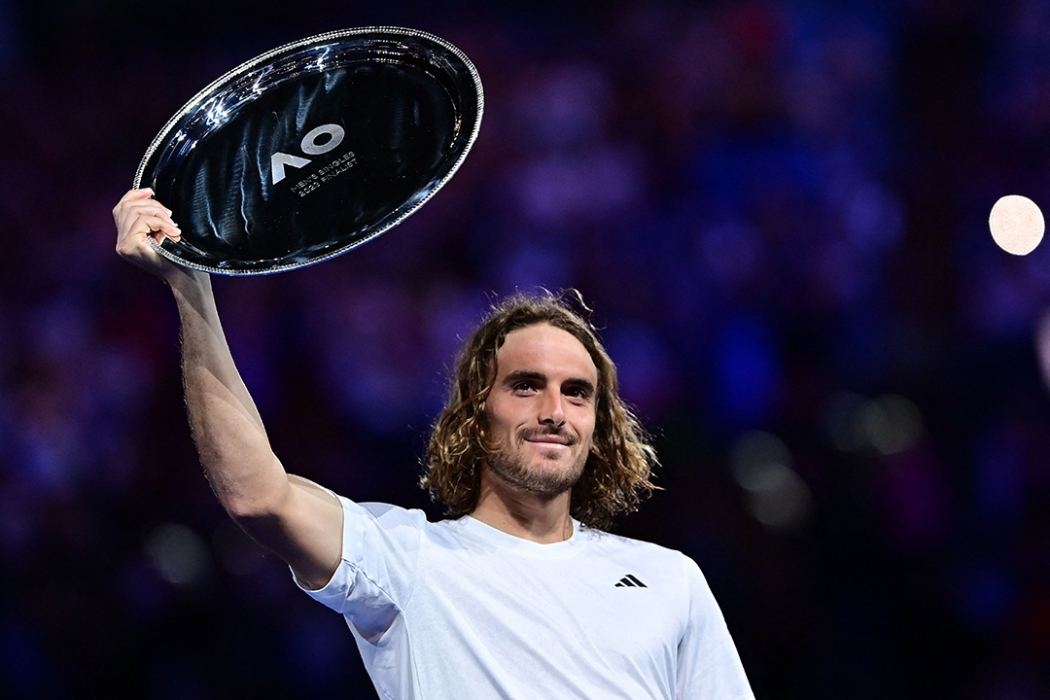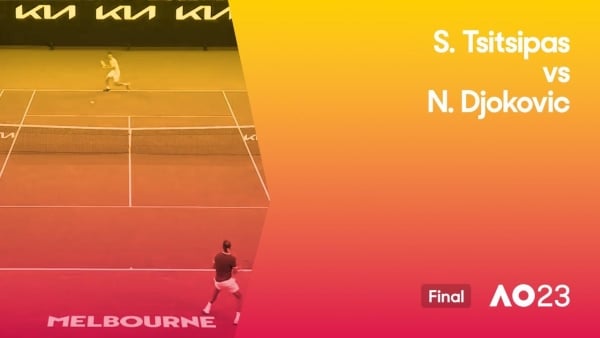His initials of 'N' and 'D' are fitting for Novak Djokovic at the Australian Open. Never Defeated in an Australian Open final.
The trend continued at AO 23, but this was unlike any other victory for Djokovic in Melbourne or possibly anywhere else. It was a huge test of mental fortitude and physical stamina.
Djokovic made his return to the Australian Open after missing last year's edition and once landing in Melbourne, didn't know how the left hamstring injury he picked up in a semifinal win over Daniil Medvedev in Adelaide would hold up.
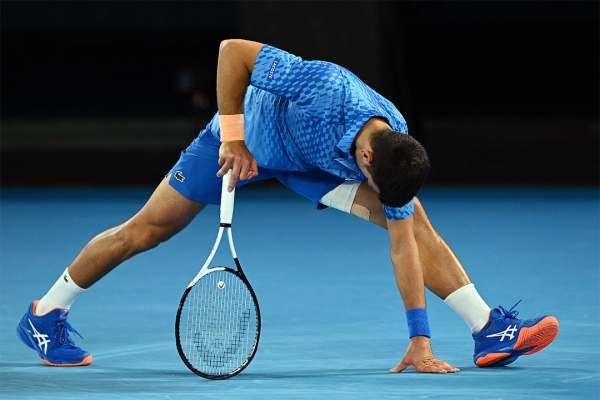
Off court, there were distractions.
So Djokovic's release after completing a 6-3 7-6(4) 7-6(5) win over Stefanos Tsitsipas made complete sense.
More emotional seemingly than ever before after bagging a major – and that says something since he now owns 10 in Australia and 22 total – Djokovic wept as he lay on the ground in the player box.
Surrounding him were, among others, mum Dijana, brother Marko and coach Goran Ivanisevic. The Serb then sobbed into his towel after making his way back to his chair.
"When I went into my box, I just think emotionally collapsed there and teared up with especially my mother and my brother when I gave them a hug, because up to that moment I was not allowing myself to, I guess, be distracted with things off the court or whatever was happening in dealing with an injury, things happening off the court, as well, that could easily have been a big disturbance to my focus and to my game," Djokovic said.
"It required an enormous mental energy really to stay present, to stay focused, to take things day by day, and really see how far I can go.
"Yeah, was a huge relief and release of the emotions in the end. Just difficult to find any additional words really. It's been a long journey, but very special one."
The journey could have ended plenty sooner.
Djokovic required heavy strapping to the hamstring in each of his matches, except for the final.
Two-and-a-half weeks ago, the way Djokovic phrased it, he "wasn't really liking" his chance of going all the way.
Ivanisevic – who watched as Djokovic won Australian Open 2021 while overcoming an abdominal injury suffered in the third round – shed more light, and the Croatian was less optimistic than that after his charge's pre-event MRI.

"I don't say 100 per cent, but 97 per cent of the players, on Saturday when you get results of the MRI, you go straight to the referee office and pull out of the tournament," said the 2001 Wimbledon winner.
"But not him. He is from other space. His brain is working different. I'm with him four years, but it still sometimes how his brain work.
"He gave everything, 77 therapies a day. Every day was kind of better and better. I didn't expect this.
"I thought I saw everything in 2021 when he won here with the abdominal tear. This one was unbelievable."
The Grand Slam schedule of not playing in consecutive days, nor practicing on off-days, assisted his recovery.
When the leg improved, the results were devastating. From the fourth round, Djokovic sizzled against Alex de Minaur, Andrey Rublev and then Tommy Paul.
MORE: AO 2023 men's singles draw
A tighter score resulted in the final, although in this case, Tsitsipas' lone window of opportunity might have been late in the second set when holding a set point.
Djokovic produced a forehand winner, not an unusual occurrence during the fortnight. In the final alone, he struck 14 forehand ground stroke winners to a mere three unforced errors.
"Here kind of when he got injured, he needed to be more aggressive," said Ivanisevic. "He stepped up and he was smacking forehands unbelievable. Really probably the best two weeks of forehands that I ever saw him in his life."
Djokovic raced into 4-1 and 5-0 leads in the second and third set tiebreaks, respectively.
Tsitsipas applying any sort of pressure on the Djokovic serve were isolated occurrences.
Overall Djokovic dropped serve in only three of his seven outings, largely through a combination of big serves when behind in the score or backing up the serve with his attacking baseline play.
Oh, and he averaged more than five breaks per match himself.
"In terms of the quality of the tennis, it's honestly some of the best tennis I've played on this court," said Djokovic.
"As good as I've played maybe in 2011 or 2015 or 2016 or those years where I really had some very strong, strong seasons and strong Australian Opens.
"I would rank it right up there. Maybe top two, three of all time of performances on Slams in general, particularly here."
The 35-year-old will only truly come to terms with his accomplishment – which also includes a return to the No.1 ranking – after a few nights' sleep.
And after that, the ever-hungry Djokovic wants to land more Grand Slam trophies.
Djokovic and "Big Three" cohort Rafael Nadal now share the men's lead in Grand Slams, with Ivanisevic likening it to a handball match tied at 22 between their respective countries of Serbia and Spain.
"IT KEEPS ME GOING": Nadal rivalry driving Djokovic on
"At this stage of my career, these trophies are the biggest motivational factor of why I still compete," said Djokovic. "That's the case without a doubt.
"I don't know how many more years I'm going to play or how many more Slams I'm going to play," he later added.
"It depends on various things. It doesn't depend only on my body. I think it's extremely important for me to be, of course, first to have the support and love from the close ones, and ability to go and play and keep the balance with the private life, but at the same time have the mental clarity or – how should I say – aspirations to really strive to chase these trophies.
"Physically I can keep myself fit. Of course, 35 is not 25, even though I want to believe it is. But I still feel there is time ahead of me. Let's see how far I go."
